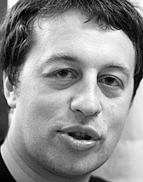 Konstantin Sonin
Konstantin SoninIt is a simple truth that optimism is fundamental to economic development. If a businessperson lacks confidence that today's investment will bring profit tomorrow, he will not invest. A banker will not extend credit if he believes next year's financial situation will be worse than today's. If a company employee does not believe that the extra effort he puts in this year will bring greater pay next year, he will likely lose motivation.
But in Russia today, just the opposite is happening. There seems to be a contest as to who can express the most pessimism about the economy. Of course, economists and government officials have objective grounds for their bearish outlook. Previous growth factors from the 1990s, such as rising world oil prices and a new generation of Russians who started businesses, have lost steam now, with no new growth factors in sight.
Economists rightly point out that market institutions established in the 1990s have either disappeared, such as direct gubernatorial elections, or like the Arbitration Court, are on their way out. Meanwhile, new institutions that could meet current and future growth needs have yet to appear. The president differs from economists in that he can do more than just see the current picture. He can directly influence it.
Of course, a president has only a very limited ability to influence the country's medium- and long-term economic development. And I know of no analytical evidence indicating that a country's leader can significantly increase the growth rate of the economy. But every leader can give a push in the right direction.
Instead of providing that push, however, President Vladimir Putin makes symbolic gestures in place of taking substantial action. At the very least, we need much more than symbolic actions.
His decision to release former Yukos CEO Mikhail Khodorkovsky is commendable but does not go far enough. Putin must convince large private business owners that their success benefits the entire country. Beyond simply granting amnesty to several thousand imprisoned businesspeople, Putin should make it clear that the energy and talents of entrepreneurs have generated this country's wealth.
Of course, Russia needs the military and police to protect it from internal and external threats, but without businesspeople and their employees, there would be no country to protect. Even great advertising cannot provide steady sales for inferior products. In the same way, government public relations is more like candy wrapper than the candy itself.
Although deeds are ultimately more important than words, leaders must at least begin with the right words. It is high time they openly acknowledge that Russia faces no real domestic or foreign threats, either military or political, but that the economic threat is very real.
If the president and government announced that economic development is their top priority, meaning that they are most concerned with the interests of the employers and employees who produce the added value in goods, it would be a small but real step in the right direction. And if they took just one such step each day, Russia would start moving forward.
Konstantin Sonin, a columnist for Vedomosti, is professor of economics and vice rector at the Higher School of Economics in Moscow.
A Message from The Moscow Times:
Dear readers,
We are facing unprecedented challenges. Russia's Prosecutor General's Office has designated The Moscow Times as an "undesirable" organization, criminalizing our work and putting our staff at risk of prosecution. This follows our earlier unjust labeling as a "foreign agent."
These actions are direct attempts to silence independent journalism in Russia. The authorities claim our work "discredits the decisions of the Russian leadership." We see things differently: we strive to provide accurate, unbiased reporting on Russia.
We, the journalists of The Moscow Times, refuse to be silenced. But to continue our work, we need your help.
Your support, no matter how small, makes a world of difference. If you can, please support us monthly starting from just $2. It's quick to set up, and every contribution makes a significant impact.
By supporting The Moscow Times, you're defending open, independent journalism in the face of repression. Thank you for standing with us.
Remind me later.







